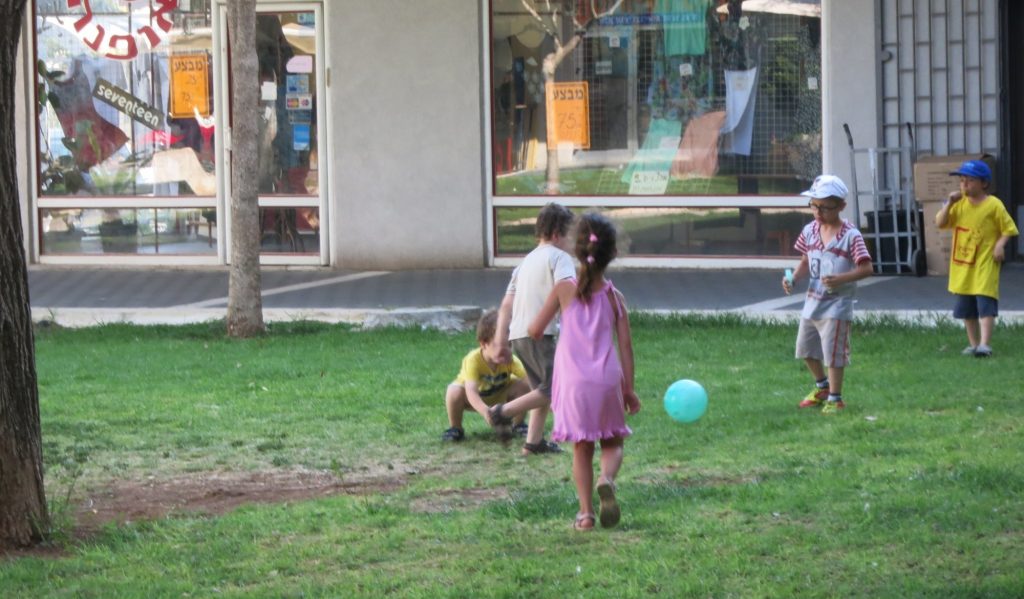Why I’m in Israel
Note added in May 2025: This article was the first one I ever wrote about travel in Israel. I just returned from another visit and it pretty much still applies just as it is, so I won’t change it except to add some comments at the end.
Disclosure: This article contains affiliate links. Making a purchase through an affiliate link will mean a small commission for this website. This will not affect your price.
Jerusalem, July 23, 2014
When I told people several months ago that I was planning to go to Israel, their reaction was usually “Oh, how interesting! I’d love to go there someday!” or “Really? How exciting!”
By the time I told people a couple of weeks ago about our trip, their reaction had changed to “Really? Is that a good idea right now?” or “You’re taking your children?” or “You’re still planning to go?”
The reason we planned this trip was that a cousin of ours is having his bar mitzvah. We could celebrate that with him, and at the same time catch up with a big branch of my family that we rarely get to see. My husband and I also see it as a great time to show our kids Israel. They’ve been here before, but they were too young to understand what they were seeing. Now they’re old enough to understand Israel’s incredibly rich history and the more recent political developments.

Why we decided to visit
Despite the conflict that has broken out here, yes, we decided to go ahead with our plans. Here’s why:
I think it’s safe to say that Jews all over the world support the existence of Israel. This does not mean we all support everything Israel does. It just means we support its existence.
For us (Jews outside of Israel), Israel is not home, but it is a place of refuge. Because of the Israeli “Right of Return,” any Jew from anywhere can emigrate to Israel if they want or need to. It gives us a safe feeling. If we are no longer welcome wherever we are living, we have a place to go. It’s interesting to note that there has been a significant wave recently of French Jews “making Aliyah”: emigrating to Israel.
American Jews, in particular, have been strong supporters of Israel both economically and politically since its founding in 1948. And Jews from all over the world go to Israel on vacations to see the holy sites.
When conflicts break out in Israel, though, these vacationers cancel their trips.

This sends a very mixed message: “We support you, and we want you to live there so that Israel will be available for us to run to if we need it. But we don’t want to take any risks, so we’ll stay away.”
So it’s okay for the Jews in Israel to live every day of the year under the threat of rocket attacks from Gaza (and this has gone on for years; it just didn’t hit the news most of the time). Yet we can’t take that same risk for just a two-week vacation.
If we support the existence of Israel (and I don’t mean supporting everything the Israeli government does – I certainly don’t.), we need to show enough solidarity to visit when we say we’re going to visit.
Besides the principle of showing solidarity for Israel in general, I also felt that if I cancelled at the last minute, I would be disappointed and my relatives would feel let down.
I’m not going to get into a discussion here about the conflict itself: the Palestinian rockets shot into Israel, or the Israeli retaliations that are taking place now. This post is just to answer this more personal question: why we chose to come here anyway.
Read my other articles about Israel and Palestine. Almost all of them are about historical sites and such – this is a travel website, after all!
Added after visiting in May 2025
This time I traveled to Israel by myself, but again it was for a bar mitzvah, which allows me to see the Israeli branch of the family all at the same time. This time, Israel’s war with Gaza, sparked by the brutal attacks by Hamas on October 7, 2023, is well into its second year. This time, when I posted that I was going there, I got knee-jerk, nasty comments, mostly about how I was “supporting genocide.”
I’d like to just urge you, if you’ve read this far, not to see the situation as black and white. There’s some grey. Or rather, neither side is entirely good or bad.
Keep in mind, for one thing, that rocket attacks from Gaza have been going on sporadically for many years and, more recently, from Yemen. It’s so commonplace that the two times the sirens went off while I was there this visit, the reactions of people around me were more about annoyance at having to go into a shelter than about any sort of fear. It’s become part of the fabric of living in Israel. I assume, though, that the reaction is much more tense in the areas nearer to Gaza, where the rockets arrive faster and can (and sometimes do) actually kill if the Iron Dome defensive system fails to stop them. Looking at this longstanding situation makes me think that October 7 was simply the last straw, as far as Israelis are concerned.
When I look at the idea of good and evil, when it comes to the situation in Israel, I see evil on both sides:
- Hamas, I would argue, is evil. It has used aid money for years not to help the people it rules, but to arm itself and build infrastructure to support its violence. It carried out that horrific attack and then used civilian locations like hospitals and schools to hide the hostages and its operatives, knowing that Gaza would suffer huge civilian casualties as a result.
- At the same time, Netanyahu’s actions are also, I would argue, evil. When I asked Israelis why he was still bombing Gaza, their answer was usually to point out that as long as he’s fighting this war, he stays in power and doesn’t have to go to court on the corruption charges against him. The sheer quantity of attacks on Gaza is ridiculously out of proportion to the initial attack. It’s punishing the population of Gaza for supporting Hamas far more than it’s punishing Hamas itself.
Yet no one seems to have a clear idea of what can be done instead. If Hamas continues to exist, it will continue to work to eradicate the state of Israel. (Google their mission statement and you’ll see that their “from the river to the sea” means, quite openly, Israel’s elimination.) If Israel takes over direct rule of Gaza, what then? What happens to the people of Gaza? Would they become Israeli citizens? That seems unlikely.
The October 7 attacks were so brutal, so random in terms of their victims, and felt so very personal in this small country, that many Israelis supported whatever Netanyahu could do to eliminate Hamas. Now, though, even many people who supported the bombing to begin with are saying enough is enough.
In fact, the majority (I’ve heard guesses of 60-75%, but they’re just guesses.) of Israelis right now – and this is something you rarely hear about in the Western media – want the bombing of Gaza to stop immediately. They have been protesting ever since the October 7 attacks. In the main cities, they protest weekly. In some places, there are permanent vigils.

I don’t know a percentage, but for some of these protesters, it’s about right and wrong: it’s wrong to keep bombing civilians and their homes, hospitals and schools. It just brings both populations further from a lasting peace. For others, the main issue is the hostages, and the urgency of bringing them home. They’re against the bombing because it endangers the hostages as well as the Gazans. For many, I’m sure, it’s a combination of both.
Netanyahu does not represent Israel as a whole. He’s one person (and his ministers) with a lot of power. Israelis come in a range of political perspectives, religions (Jews, Christians, Muslims, Baha’i), ethnicities, colors, etc. It’s a hugely diverse country. Condemning Israel as a whole is akin to saying “I hate Americans” because you disagree with Trump’s actions. There’s far more nuance – far more different points of view – than you ever see in the media.
Feel free to comment below, but please keep it civil!
My travel recommendations
Planning travel
- Skyscanner is where I always start my flight searches.
- Booking.com is the company I use most for finding accommodations. If you prefer, Expedia offers more or less the same.
- Discover Cars offers an easy way to compare prices from all of the major car-rental companies in one place.
- Use Viator or GetYourGuide to find walking tours, day tours, airport pickups, city cards, tickets and whatever else you need at your destination.
- Bookmundi is great when you’re looking for a longer tour of a few days to a few weeks, private or with a group, pretty much anywhere in the world. Lots of different tour companies list their tours here, so you can comparison shop.
- GetTransfer is the place to book your airport-to-hotel transfers (and vice-versa). It’s so reassuring to have this all set up and paid for ahead of time, rather than having to make decisions after a long, tiring flight!
- Buy a GoCity Pass when you’re planning to do a lot of sightseeing on a city trip. It can save you a lot on admissions to museums and other attractions in big cities like New York and Amsterdam.
- Ferryhopper is a convenient way to book ferries ahead of time. They cover ferry bookings in 33 different countries at last count.
Other travel-related items
- It’s really awkward to have to rely on WIFI when you travel overseas. I’ve tried several e-sim cards, and GigSky’s e-sim was the one that was easiest to activate and use. You buy it through their app and activate it when you need it. Use the code RACHEL10 to get a 10% discount!
- Another option I just recently tried for the first time is a portable wifi modem by WifiCandy. It supports up to 8 devices and you just carry it along in your pocket or bag! If you’re traveling with a family or group, it might end up cheaper to use than an e-sim. Use the code RACHELSRUMINATIONS for a 10% discount.
- I’m a fan of SCOTTeVEST’s jackets and vests because when I wear one, I don’t have to carry a handbag. I feel like all my stuff is safer when I travel because it’s in inside pockets close to my body.
- I use ExpressVPN on my phone and laptop when I travel. It keeps me safe from hackers when I use public or hotel wifi.



Thanks Rachel, you make it clearer to me! I can understand now why you are there and I understand your choice! Enjoy the time with your relatives and family! Return home safely!
Thanks!